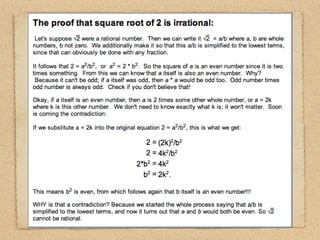
(EDIT) To rephrase my question: are there any inherent mathematical reasons that contribute to explaining why proofs can be incredibly difficult?Īlthough this question may superficially look opinion-based, in actual fact there is an objective answer. So seemingly certain proofs are actually inherently difficult. What is the reason for this? Is it humans' lack of intelligence? Lack of creativity? There is the field of automated theorem proving which I tried to seek some insight from, but it looks like the algorithms produced from this field are subpar when compared to humans, and even these algorithms are obscenely difficult to implement. So clearly, in many cases, mathematicians have to bend over backwards to prove certain logical conclusions. In 1993, Wiles announced the final proof of Fermat's Last Theorem, which was originally stated by Fermat in 1637 and was "considered inaccessible to prove by contemporaneous mathematicians" ( Wikipedia article on the proof). And there are countless better examples of difficulty. I haven't read the proof itself, but it being ~320 pages long doesn't really suggest easiness.

The Poincaré Conjecture took just short of a century to prove. It literally follows from the assumptions! However, this clearly isn't the case (for a lot of proofs, at least). To elaborate: it seems to me that if you have a few (mathematical) assumptions and there is a logical conclusion which can be made from those assumptions, that conclusion shouldn't be too hard to draw.

I am asking in a purely technical sense (but still only with regards to mathematics that's why I deemed this question most appropriate to this Stack Exchange). This is not a complaint about my proofs course being difficult, or how I can learn to prove things better, as all other questions of this flavour on Google seem to be.


 0 kommentar(er)
0 kommentar(er)
